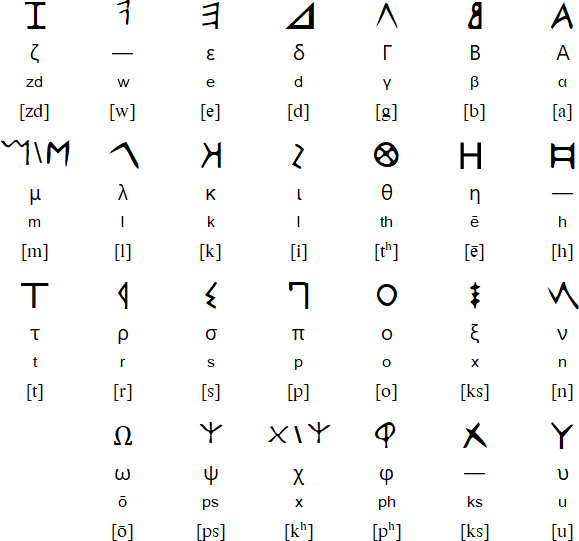
/learn-the-greek-alphabet-1525969_v2-5b48e691c9e77c0037b0f431.png)
The following pronunciation guide is simply one reconstruction. However, please note that scholars do not agree on the pronunciation of Ancient Greek.

Through various methods, particularly by comparison with other languages, and observation of sounds that are confused, we can form good estimates. It is difficult, but not impossible, to reconstruct the pronunciation of an ancient language. Can be pronounced by pronouncing ee while pursing the lips as if for the oo in "food."

The most important thing to remember, though, is that epsilon and omicron are short, whereas eta and omega are long.ħ. In English, the "long" ā sound in "bait" is actually short when compared to the word "bayed." Similarly, the "short" ĕ sound of "bed" is long when compared to the word "bet." (It's the following consonant that determines the length in English.) In Ancient Greek, short epsilon had the sound of ā in "bait," while long eta had the sound of ĕ in "bed." The story is similar for omicron and omega (but because of variation in the way English is pronounced, it is not easy to find example words). The Greek letters epsilon and omicron were short and contrasted with the long eta and omega. Due to changes in the English language over time, the terms "long" and "short" are confusing here. This form is called sigma lunate, because it looks like a crescent moon.Ħ. the letter σ is written ς at the end of words, e.g. The following "H" sound is called aspiration.ĥ. While this affected the spelling it did not affect pronunciation, resulting in two pronounced sounds (t-h, p-h, k-h). When one word ends with either τ, π, or κ, and the word directly following begins with ϩ, the last letter of the first word will often contract with the first letter of the second word, resulting in θ, φ, and χ, respectively (e.g. Coptic, unlike Greek, has a letter that corresponds to the English letter "H", which is ϩ or hori (Greek only has the rough breathing mark). Evidence for this comes to us from Coptic, a language once spoken in Egypt. While many pronounce these characters according to the English sounds "th" (as in thin) and "ph" (as in photo) and the Scottish "ch" (as in loch), scholars suggest that this is not the correct ancient pronunciation. the letters ξ, ζ, and ψ all represent double consonant sounds (ks, zd, ps).Ĥ. the letters ι, α, and υ can represent short and long vowels.Ģ. Ng (ki ng) wherever it precedes γ, κ, ξ, or χ 2ġ. 3.2.1.2 Persistent Accents (Nouns and Adjectives).


 0 kommentar(er)
0 kommentar(er)
